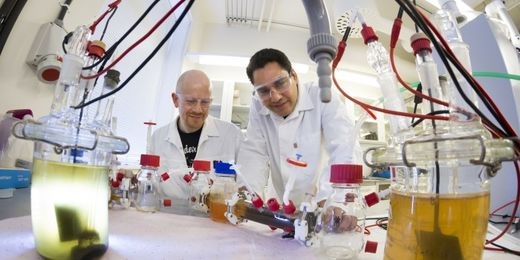When biologist Netzer (left), who specialises in bioprocesses, met electrochemist Colmenares, whose field is
water purification, they came up with the idea of a practical, microbial, energy-generating water purification system.
Today their demonstration plant is up and running.
This is an environmentally-friendly process for the purification of water derived from industrial processes and suchlike", says SINTEF researcher Luis Cesar Colmenares, who is running the project together with his colleague Roman Netzer. "It also generates small amounts of electricity - in practice enough to drive a small fan, a sensor or a light-emitting diode", he says.
In the future, the researchers hope to scale up this energy generation to enable the same energy to be used to power the water purification process, which commonly consists of many stages, often involving mechanical and energy-demanding decontamination steps at its outset.
Nature's own generator
The biological fuel cell is powered by entirely natural processes - with the help of living micro-organisms.
"In simple terms, this type of fuel cell works because the bacteria consume the waste materials found in the water", explains Colmenares. "As they eat, the bacteria produce electrons and protons. The voltage that arises between these particles generates energy that we can exploit. Since the waste in the wastewater (organic material) is consumed and thus removed, the water itself becomes purified", he says.
The electrons produced at the anode migrate via an external circuit and generate electricity. The protons produced at the same time migrate through the membrane. When the electrons are reunited at the cathode, they react with the oxygen to produce water and hydrogen peroxide. The hydrogen peroxide (also used to bleach hair) is used as a component in the water purification process. The fuel cell requires no electricity supply.
You can read the article in its entirety at :
http://www.sott.net/article/292074-Researchers-discover-environmentally-friendly-process-for-the-purification-of-water

 RSS Feed
RSS Feed